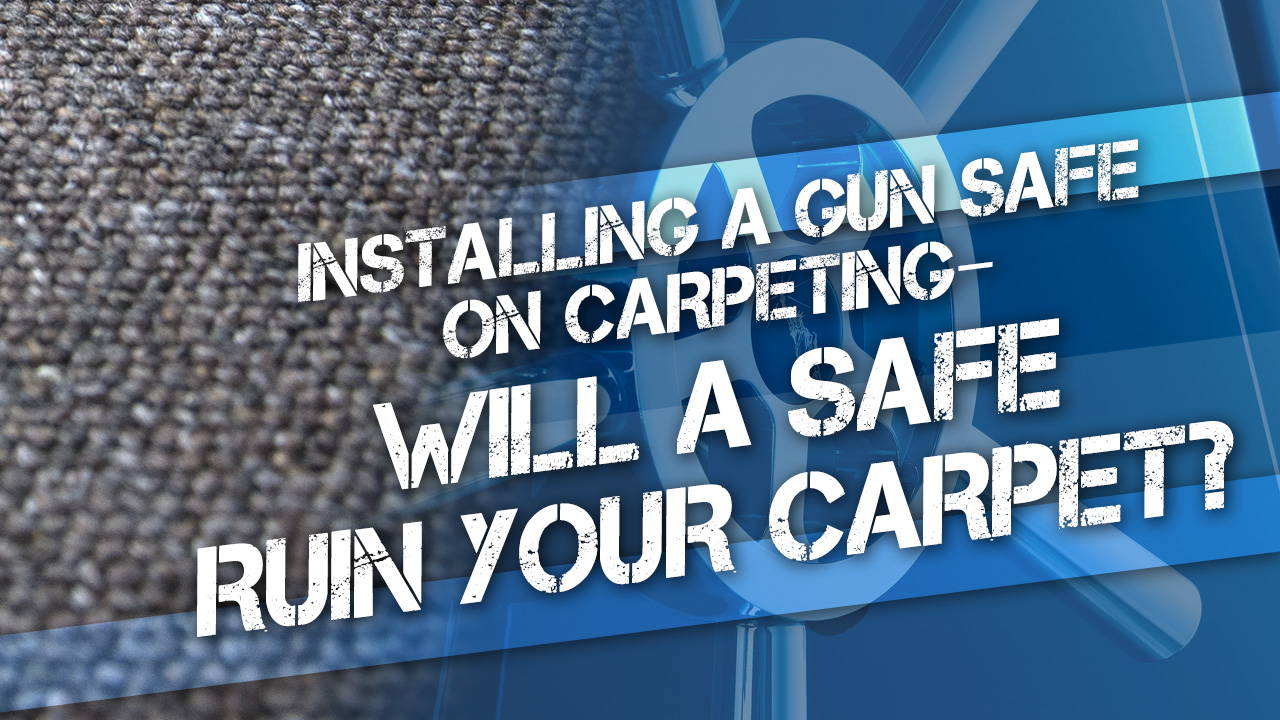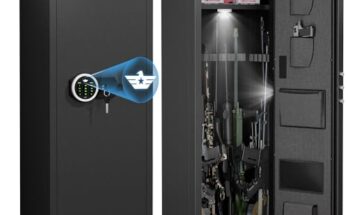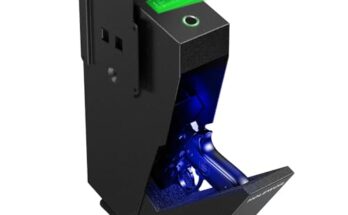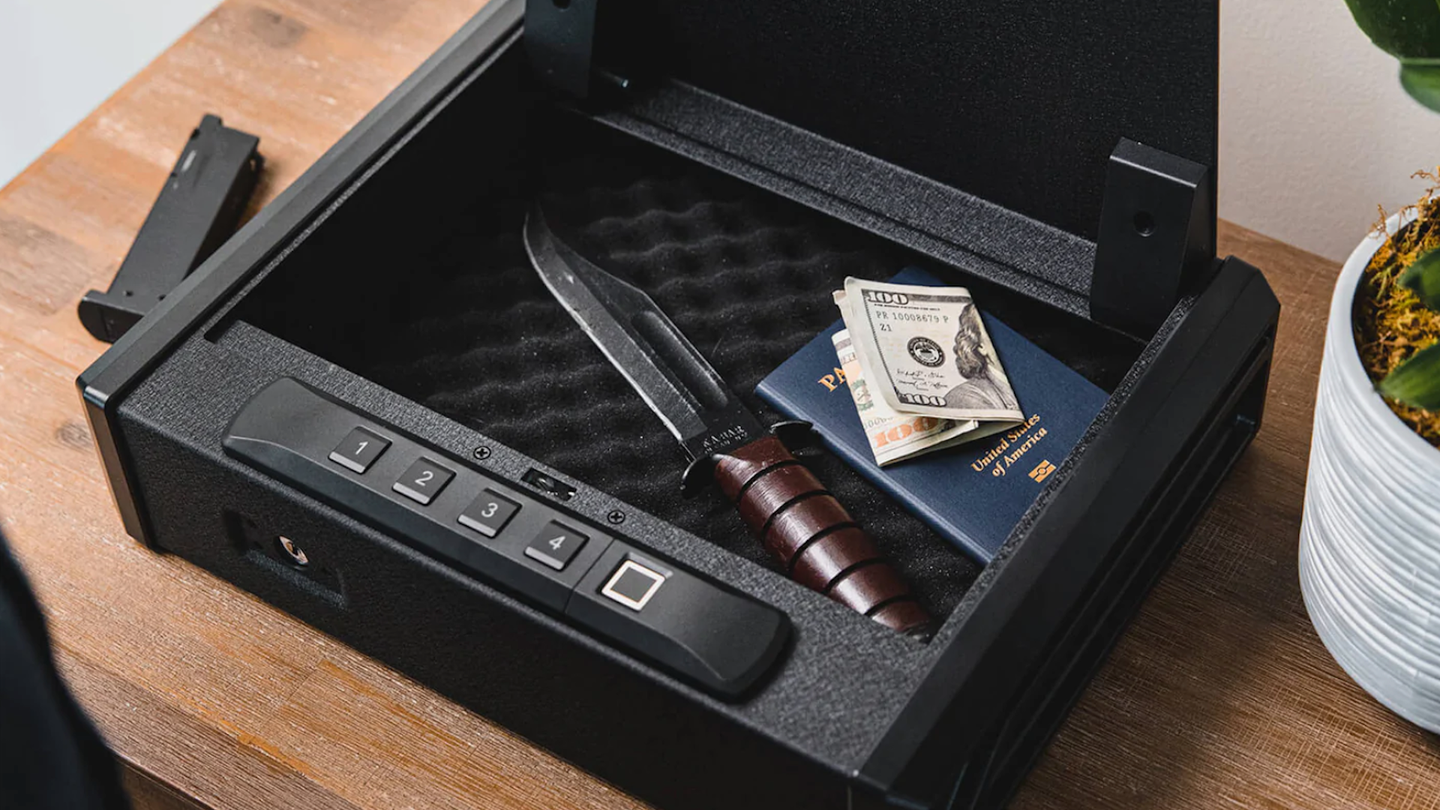A heavy gun safe can potentially damage your floor if not properly supported. The type of flooring can influence the level of risk of damage.
Gun safes are essential for firearm security but they can be incredibly heavy, often weighing hundreds or even thousands of pounds. Concerns about floor damage are common among gun safe owners. Ensuring your safe is correctly installed and distributed across your floor is crucial to prevent any harm.
Heavy safes, especially when not on reinforced ground or without adequate support, may strain or even crack certain types of flooring. It’s essential to assess both the weight of your safe and the maximum load capacity of your floors before installation. Taking preventive measures such as using a reinforced base or distribution pads can mitigate the risk of damage, keeping both your firearms and home in pristine condition.
Weighing The Risks: Can Gun Safes Cause Floor Damage?
Welcome to our discussion on whether your safe can hurt your floors. Gun safes serve as crucial fixtures in homes for firearm safety. Yet, many overlook a simple question: could these hefty safes be harmful to your floors? It’s a valid concern. Let’s explore the possibility and learn how to safeguard our homes.
Assessing The Weight Of Gun Safes
Understanding a safe’s weight is crucial. A typical gun safe can range from 300 to over 1,000 pounds. Before installing a safe, one must evaluate its mass in relation to the floor’s capacity.
- Lightweight safes – < 500 lbs, suitable for most floors
- Medium safes – 500-750 lbs, requires floor strength check
- Heavyweight safes – > 750 lbs, potential risk for floor damage
Place heavy safes on ground floors or basement levels. Always consult a structural engineer for heavy or commercial-grade safes.
Types Of Flooring At Risk
Not all floors have the same strength. Consider your home’s flooring before installation.
| Floor Type | Risk Level |
|---|---|
| Hardwood | Medium |
| Carpet over plywood | High |
| Concrete | Low |
| Tile | High |
| Laminate | Medium |
Concrete floors handle heavy safes best. Check with professionals for other types.
Remember, protecting your firearms shouldn’t lead to costly floor repairs. Consider safe weight and flooring type to keep both secure.
Factors That Influence Floor Damage
Placing a gun safe in your home requires careful consideration. One question to examine is: will a gun safe damage my floor? Several factors contribute to floor damage, ranging from the safe’s size and weight distribution to the material and strength of your floor. Understanding these influences helps prevent unwanted harm to your living space.
Safe Size And Distribution Of Weight
The dimensions and weight of a gun safe are crucial when assessing risks to flooring. Larger safes exert more pressure on floor surfaces. Weight distribution plays a role, too. A safe concentrated on a tiny area exerts greater stress, increasing the potential for damage. Compare this to a safe with a larger footprint, which spreads weight uniformly and minimizes risk.
- Consider safe weight-per-square-inch
- Check load-bearing capacity of floors
- Use support pads to evenly distribute weight
Flooring Material And Structural Support
Flooring types influence the durabilitygun safe resilience. Hardwood can bear weight decently but may suffer over time. Carpeted areas can seem forgiving, yet they conceal the true nature of support beneath. Concrete slabs offer robust support for heavy safes with little worry. Always confirm the floor’s maximum load capacity with a professional.
| Flooring Type | Durability |
|---|---|
| Hardwood | Medium |
| Carpet | Variable |
| Concrete | High |
Potential For Scratching Or Denting
Movements, such as dragging or shifting a gun safe, can lead to scratches or dents on floors. Protective measures include using felt pads or rubber mats. Placement should be static to avoid repetitive harm. Dents often occur in softer wood or when heavy objects get dropped. Precautionary steps ensure sustained floor integrity.
- Employ protective coverings like rubber
- Avoid dragging; lift with care
- Regularly inspect the safe’s position
Prevention Tactics For Protecting Your Floors
Worried about a heavy gun safe harming your beautiful floors? It’s valid to think about the potential damage a hefty metal box can cause. But don’t fret — with the right prevention tactics, you can keep your floors as pristine as when they were new. Let’s explore how to shield your floors from any harm a gun safe might pose.
Utilizing Floor Mats And Protective Pads
Heavy-duty floor mats and protective pads provide a simple solution to prevent scratches and indentations.
- Place a mat underneath the safe to act as a barrier.
- Use rubber pads to distribute the weight evenly.
- Choose materials that don’t slip to ensure the safe remains steady.
These mats and pads can be cut to fit the exact size of your safe, making protection discreet and effective.
Considering The Placement Of The Safe
Strategic safe placement can limit potential floor damage. Consider the following tips:
- Install the safe near a load-bearing wall to help with weight distribution.
- Place your safe in a corner where two exterior walls meet for added stability.
- Avoid areas where the floor is weaker or prone to moisture.
Picking the right spot will spare your floor from unnecessary strain.
Regular Maintenance To Mitigate Risks
Consistent upkeep is key to preventing floor damage:
| Task | Frequency |
|---|---|
| Check mats/pads | Every 3 months |
| Inspect safe’s position | Twice a year |
| Look for floor changes | With every cleaning |
Stay ahead of any potential issues by being proactive in your safe’s maintenance.

Credit: www.be-safe.org
Installation Insights For Gun Safe Owners
Understanding the best practices for installing a gun safe is crucial. A correct installation ensures your valuables stay secure without harming your floors. This guide offers insights to assist gun safe owners in making informed decisions. Learn the right approach for your safety and flooring preservation.
Professional Installation Vs. Diy Approaches
Deciding between a professional install or a DIY job? Weigh these considerations:
- Expertise: Pros bring experience and precision.
- Equipment: Specialized tools may be required.
- Warranty: Self-install could void guarantees.
- Time: Professional service saves personal time.
A pro installer ensures your safe is anchored correctly. This prevents floor damage and maintains the integrity of your gun safe.
Balancing Weight And Security Needs
Considering safe weight and security level is important. Keep balance in mind:
| Safe Weight | Security Level | Floor Capacity |
|---|---|---|
| Lighter Units | Basic | Suitable for most floors |
| Heavier Units | Advanced | May require floor evaluation |
Ensure the selected safe matches your home’s structure. An unbalanced choice could lead to risk and damage.
Reinforcement Tips For Weaker Flooring
High-weight safes demand strong floors. If your floor is weak, follow these reinforcement steps:
- Assessment: Get a professional to check your flooring.
- Supports: Consider adding joists or beams.
- Materials: Use plywood or steel for surface strength.
- Distribution: Spread the weight with a broader footprint.
Tailor reinforcement plans to your safe’s specifications. This avoids damage and upholds security.
When Damage Occurs: Response And Repairs
Discovering your floor has sustained damage from a gun safe can be unsettling. Floors bear the weight but may suffer over time. Quick response to any harm ensures the integrity of your home’s foundation remains secure. Effective repairs can restore your floor’s original grandeur, sidestepping the need for a complete overhaul. Learn how to address and mend such mishaps with ease.
Identifying Signs Of Floor Damage
Spotting floor damage early can prevent larger issues. Look for these clues:
- Uneven flooring: A wobbly gun safe could signal a problem.
- Cracks: Check for splits in tiles or concrete near the safe.
- Discoloration: Moisture from the safe might stain your floor.
- Indentations: Heavy safes could leave lasting impressions.
Repair Solutions For Various Flooring Types
Each flooring type requires a unique fix. Consider these options:
| Flooring Type | Repair Method |
|---|---|
| Hardwood | Use wood filler or sand and refinish affected area. |
| Carpet | Stretch the carpet or replace damaged section. |
| Tile | Replace cracked tiles and reapply grout. |
| Laminate | Swap out damaged planks with new ones. |
| Concrete | Fill cracks with epoxy or concrete patch. |
Understanding Warranty And Insurance Coverage
Knowing your coverage helps in managing repair costs.
Warranty: Check if your floor’s warranty covers the damage. It might fully or partially cover repair costs.
Home Insurance: Contact your provider to see if your policy includes such damages. They can guide you through the claim process.

Credit: www.libertysafe.com

Credit: www.reddit.com
Frequently Asked Questions Of Will A Gun Safe Damage My Floor
Is A Gun Safe Too Heavy For My Floor?
Most residential floors can support a standard gun safe without structural issues. Consult a professional to assess your specific floor’s load-bearing capacity if concerned about particularly heavy safes.
Can My Floor Support 300 Pounds?
Most residential floors can support 300 pounds, but it’s essential to consider the floor’s construction and condition. Consult a structural engineer for a precise assessment.
Should You Put Something Under A Gun Safe?
Yes, placing a protective mat or rubber pad under a gun safe can help prevent moisture buildup and protect your floor from damage.
Where Should You Not Put A Gun Safe?
Avoid placing a gun safe in areas prone to moisture like basements or garages. Keep it out of plain sight to deter theft and do not place it near fire hazards. Avoid placing it in bedrooms or common living spaces for safety reasons.
Conclusion
To wrap up, protecting valuables with a gun safe shouldn’t compromise your flooring. Assess the floor type, weight capacity, and safeguard with proper installation. Regular checks and preemptive measures will ensure both security and floor integrity. Remember, a well-placed safe adds peace of mind without any structural concerns.



